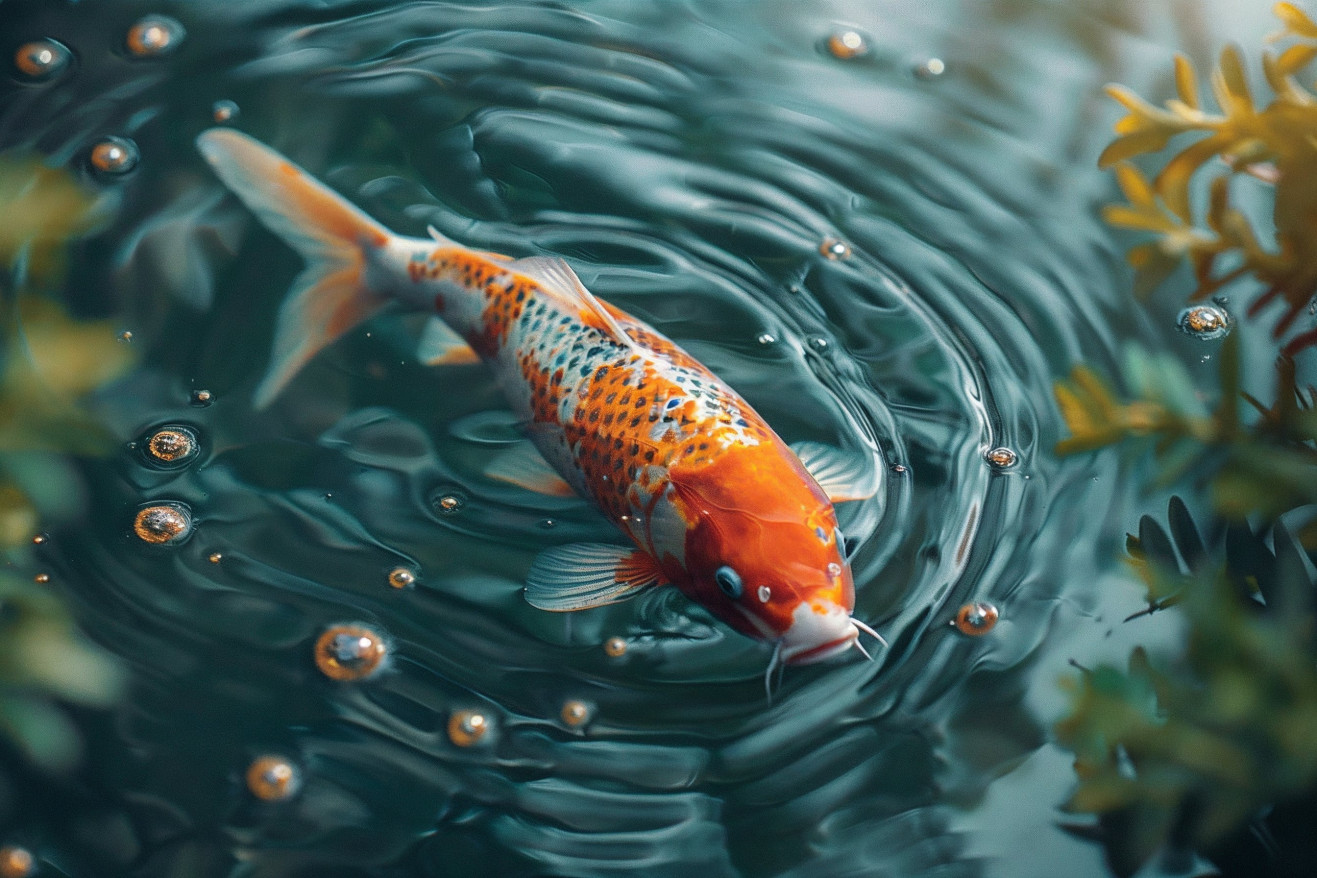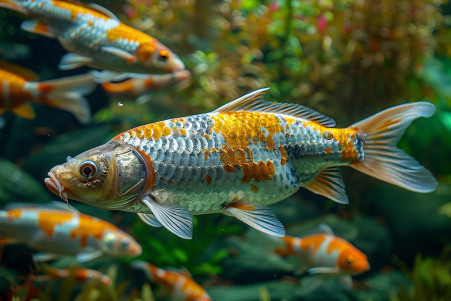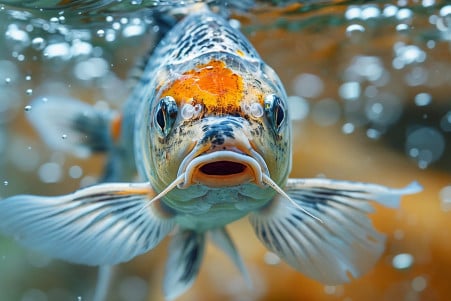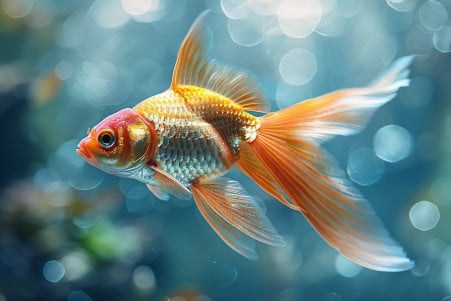How Long Do Koi Fish Live? Unveiling Their Lifespan Secrets
22 February 2024 • Updated 22 February 2024

Commonly found in ornamental ponds, koi fish are known for their potential to live incredibly long lives. When given the right conditions, koi fish can live an average of 25–35 years. In some rare cases, Japanese koi have even been known to live for more than 200 years.
Genetics, diet, water quality, and environmental factors all play a role in how long koi fish live, and the koi known as Hanako lived the longest at 226 years.
In this article, we will explore interdisciplinary research on koi fish lifespan, which includes everything from veterinary science to aquatic ecology. We will look at research that has investigated the genetic, husbandry, and environmental factors that have led to the koi fish’s impressive lifespan. We will also consider the cultural factors that have shaped koi care and have helped ensure that koi fish can live for decades, and sometimes even centuries, in human-managed environments.
How long do koi fish live?
Inside the World of Koi Fish Longevity: More Than Just the Average
Koi fish are known for their bright colors and peaceful presence in backyard koi ponds, and their lifespans are often longer than many other types of fish kept in aquariums. On average, koi owners can expect their fish to live between 25 and 35 years with the right care.
But that’s just the average; under the best circumstances, some koi have lived to be between 50 and 60 years old, and in some cases, even up to 100 years old, according to AquariumStoreDepot.
While the story of Hanako, a famous koi that reportedly lived to be 226 years old, is almost certainly a legend, it does illustrate how much koi can live if everything goes right. Their age can be verified by examining their otoliths, which are a reliable way to determine a fish’s age, but this requires the expertise of an aquatic veterinarian, according to Next Day Koi.
In contrast, other types of ornamental fish have much shorter lifespans, which makes koi’s longevity even more impressive. The things that have been shown to contribute to koi’s long lives, including genetics, diet, and good care, are supported by both research and real-world experience. A deeper look at genetics and breeding explains how these factors work together to help koi live for so long.
Genetics of Koi Fish Longevity
The mystery of koi fish longevity is largely due to their genetics. Studies have shown that today’s ornamental koi originated from a genetically diverse gene pool that was created by centuries of selective breeding in Japan.
For example, a paper by Boris Gomelsky and Servaas de Kock, Japanese Ornamental Koi Carp: Origin, Variation and Genetics, which is available on ResearchGate, explains how the selective breeding that created koi has not only improved their appearance but may have also improved their health and longevity.
Selective breeding has been used to create koi strains that have better growth, size, and longevity, and it has set Japanese koi apart from other types of koi.
One of the most interesting aspects of koi genetics is their skin pigmentation, which is important for their ornamental value, and is controlled by microRNAs, according to a paper by Lanmei Wang that was published in BMC Genomics. These microRNAs control gene expression, including the expression of genes that control color traits that are inherited, and this shows how complex the relationship between genetics and longevity can be.
The genetic diversity of koi strains, particularly those that have been bred in Japan’s clean waters, may also help explain their long life spans. This commitment to genetic diversity is a legacy that is about more than just looks, and it has built good health and longevity into the genetics of these peaceful fish.
As koi owners and breeders continue to try to find the perfect balance between beauty and longevity, the importance of proper care is more important than ever to make sure that these living jewels are able to thrive in their watery homes.
How to Live Long: Koi Care
In addition to their association with determination and good fortune, koi have specific needs that must be met to ensure they live long lives. One of the most important factors is their diet. Koi are omnivores, and they need a diet that includes both animal and plant-based foods. Japan Wonder Travel notes that a well-balanced diet is important for the health and longevity of these valuable Japanese fish.
Another important factor is the water in which koi live. Koi need to live in a clean, well-maintained pond with water that is free from pollutants and other harmful substances.
This means that koi owners need to keep an eye on the pH, temperature, and cleanliness of the water to make sure that it stays in the best condition possible for koi. This is especially true of traditional Japanese water gardens, which are specifically designed for koi.
Koi lovers who want to make sure that their koi live as long as possible can follow these traditional Japanese practices to make sure that their fish are as healthy as possible. By doing so, koi owners can make sure that their fish not only survive but also thrive, showing off their majestic beauty and adding to the peaceful ambiance of a koi pond.
Because of the way that koi and their environment work together, it’s especially important to make sure that the water in the pond is as clean as possible.
Keeping Koi Healthy: The Importance of Clean Water
Water is the source of life for koi fish, and it’s also their home. As such, it’s important to make sure that the water in which koi live is as clean and healthy as possible.
There are several factors that can affect the health and well-being of koi, and it’s important to make sure that these factors are always within healthy ranges. According to POND Trade Magazine, one of the most important factors is oxygen, and it’s important to make sure that oxygen levels never fall below 3–4 parts per million (ppm) to keep koi from becoming stressed or sick.
It’s also important to make sure that pH levels are between 7 and 8 to avoid negative health effects.
In addition, it’s important to make sure that water parameters are tested and adjusted regularly to avoid toxicity, as noted by Koi Fish Information. This includes making sure that ammonia and nitrite levels are kept as low as possible. It’s also important to make sure that water temperatures are kept between 59°F and 77°F to avoid stress and disease.
To help maintain these levels, it’s important to use water test kits and biofilters, which help to control ammonia and stabilize pH, according to Koi Pond Water Quality. It’s also important to use de-chlorinators and water conditioners, which can help to remove harmful substances like chlorine and chloramine, to make sure that koi are living in the healthiest environment possible.
By making sure that water quality is a priority, koi lovers can make sure that their koi are living in the healthiest environment possible, which will help to ensure that they live long, healthy lives and show off their beauty and vitality for years to come.
Dealing With Health Challenges to Ensure Koi Well-Being
Koi fish, living in their peaceful ponds, face a number of health challenges that can impact their lifespans. Premier Pond lists diseases like Anchor Worm, Fin Rot, and Ich as three of the 17 common diseases that can lead to a koi’s shortened life.
It’s important to avoid these diseases and make sure that they are treated as soon as possible. Next Day Koi stresses the importance of knowing the early signs, which can include changes in a koi’s behavior and physical appearance.
Veterinary medicine and research into diseases have made and continue to make strides that will help improve the way that koi health is managed and treated. Taro Kodama provides a comprehensive health checklist that walks through a step-by-step process to recognize symptoms and then treat them with the right solutions, including bath treatments and medicated feeds.
With careful attention to their care and regular consultations with professionals, koi owners can work to minimize the impact of health issues and keep their koi healthy. In the end, it’s important to stay on top of their care and be aware of the potential health issues that can impact them to ensure that a koi population is healthy and long-lived.
On the Path to Koi Longevity
Looking at the many factors that contribute to koi fish lifespan, it’s clear that genetics, care, water quality, and health all play a role in how long koi live. These factors work together to determine how long koi will live in our backyard ponds.
Japanese koi have been bred to have strong genetics that support a long and healthy life. When this is combined with the care that has been passed down through the generations, it’s possible for koi to live much longer than the average fish.
Water quality, which is so important to koi health, ensures that the environment they live in is as close to the purity of their natural environment as possible. Disease management and veterinary care help koi overcome the many health challenges they face, helping them live longer lives.
The koi fish lifespan is a lesson in how to care for aquatic animals and a lesson in balance and concord. When we take what we’ve learned and apply it, we can help koi thrive, and in doing so, we can thrive as well.
In the reflection of a koi pond, we see a beautiful combination of art and science and a timeless quest for a long and healthy life.


